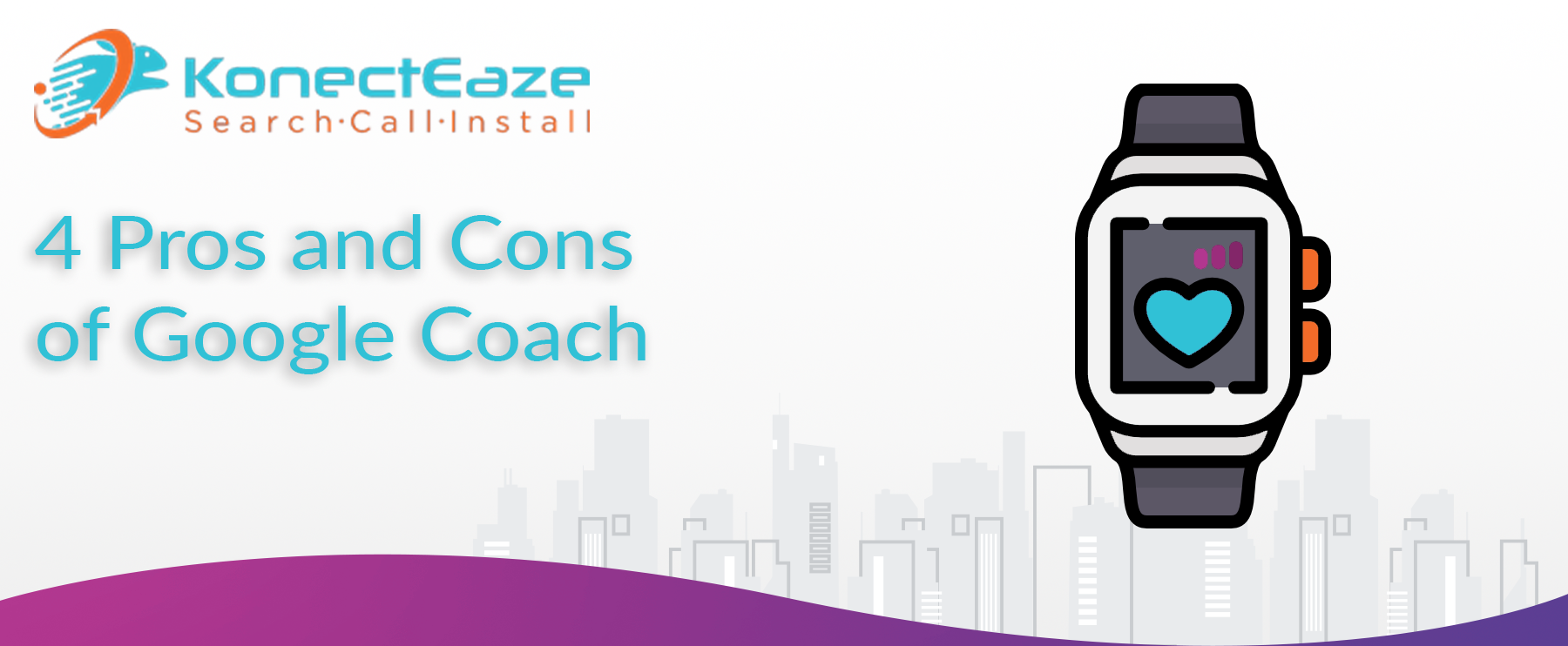Google is already working on a grammar checker for their Google Docs, and displaying data in all their searches. Now Google is rolling out Google Coach.
14 November, 2024 | Posted by:
Category: Apps, Business Internet, News, Reviews, Technology, Tips | No Comments

Google Coach, Google's virtual health and wellness assistant, has garnered attention for its comprehensive approach to fitness and health tracking. As with any technology, it has its strengths and weaknesses. Here’s an updated analysis for 2024:
Google Coach utilizes AI and machine learning to provide personalized fitness and health recommendations. It analyzes your activity patterns, dietary habits, and health goals to offer tailored suggestions, making it easier to stay on track with your wellness journey.
Google Coach integrates seamlessly with other Google services and devices, such as Google Fit, Wear OS, and Android smartphones. This integration ensures a cohesive user experience, allowing you to track your fitness data across multiple platforms without any hassle.
Beyond just fitness, Google Coach offers a comprehensive approach to health. It monitors your sleep patterns, nutrition, and stress levels, providing insights and recommendations to improve your overall well-being. This holistic approach helps users maintain a balanced lifestyle.
One of the standout features of Google Coach is its ability to provide motivational support. It sends reminders, encouragement, and actionable tips to keep you motivated and engaged with your health goals. This constant support can be a significant factor in maintaining long-term health habits.
With any health-related technology, privacy is a major concern. Google Coach collects a vast amount of personal health data, raising questions about how this data is stored, used, and protected. Users need to be aware of the privacy policies and ensure their data is secure.
Relying heavily on a digital assistant for health and fitness guidance can create a dependency on technology. This might lead users to overlook the importance of human interaction and professional medical advice. It's essential to balance technology use with real-world support.
While Google Coach is integrated into the Google ecosystem, it might not be as accessible to users who don't use Google products. Those who prefer other ecosystems, such as Apple's, may find it challenging to fully utilize Google Coach's features.
With constant notifications and reminders, there is a risk of information overload. Users might feel overwhelmed by the sheer volume of advice and prompts, which could lead to disengagement. Finding a balance between helpful reminders and overload is crucial for user retention.
Google Coach offers a promising blend of personalized health recommendations, seamless integration, and motivational support. However, privacy concerns, dependency on technology, limited accessibility, and the potential for overload are important considerations. As Google continues to refine and enhance this service, it will be interesting to see how these pros and cons evolve.
Soon classes at your local college will start. Here are five tech must-haves for dorm living to get the most out of your college experience.
14 November, 2024 | Posted by:
Category: Entertainment, Humor, Reviews, Streaming, This & That, Tips | No Comments

Soon classes at your local college will start. Here are five tech must-haves for dorm living to get the most out of your college experience:
You will be writing, period. A good laptop is essential. Look for one with 8 to 16GB of RAM and ample storage to handle all your academic and personal needs.
Use virtual storage like Google Drive to save your work and access it anywhere. It prevents last-minute panics if you forget a flash drive or have technical issues.
Bonus: An external hard drive for added peace of mind.
Portable speakers allow you to enjoy music anywhere. Brands like JBL, Canz, Bose, and Sony offer great options.
Dorms can be noisy. Invest in noise-cancelling headphones from brands like Bose, Plantronics, AKG, and Beats to focus on your studies without distractions.
Smart TVs offer great resolution and apps like Netflix, Hulu, and Amazon Prime. This consolidates your entertainment options and saves space.
Bonus: Chromecast, Roku Firestick, or Apple TV can supplement your smart TV for streaming.
Facebook found and banned 32 pages linked to "inauthentic behavior." With fake news becoming more and more prevalent, how can we guard against it?
14 November, 2024 | Posted by:
Category: News, Technology, Tips | No Comments

Facebook recently banned 32 pages linked to inauthentic behavior, aiming to influence upcoming elections. Given the prevalence of fake news, here are five ways to check Facebook campaigns:
When you see a story or claim on Facebook, verify it with multiple reputable news sources to ensure its accuracy. Cross-referencing helps identify fake news and provides a broader perspective on the issue. Use trusted news websites, fact-checking organizations, and official statements to confirm the validity of the information.
Just because a large number of people believe something doesn’t make it true. Always question initial assumptions. Confirmation bias can lead to accepting information that aligns with preexisting beliefs without critical analysis. Challenge your assumptions and seek out information that may contradict your initial thoughts to get a well-rounded view.
Distance yourself from the immediate reactions of others to better assess the validity of the information. Emotional responses can cloud judgment, making it harder to discern fact from fiction. Taking a moment to think critically about the information can prevent the spread of misinformation.
Evaluate where the information is coming from and whether it is a trusted source. Look for established and reputable outlets known for factual reporting. Check the credibility and background of the author or page posting the information. Be wary of sources that have a history of spreading misinformation or are known for sensationalism.
Acknowledge personal biases that might influence your acceptance of certain information and be open to opposing viewpoints. Being aware of biases helps in critically analyzing information and being more receptive to different perspectives. Engaging with diverse sources and opinions can help create a more informed and balanced understanding.
Fake news and inauthentic campaigns can influence public opinion and elections. Being vigilant and critical of the information encountered on social media is essential for a well-informed public. Understanding how to evaluate and verify information helps in making informed decisions and promotes a healthier media environment. Social media platforms have become powerful tools for spreading information quickly, and with that power comes the responsibility to ensure the accuracy and integrity of the information being shared.
Social media companies like Facebook have a significant role in combating misinformation. Implementing stricter policies, utilizing advanced algorithms to detect fake accounts and pages, and collaborating with fact-checkers are crucial steps. Users should also be encouraged to report suspicious content and participate in digital literacy programs to better understand how to navigate the online information landscape.
Creating a community of informed users requires effort from both the platform and its users. Encouraging critical thinking, promoting reliable sources, and fostering respectful discussions are essential. By collectively working towards a more informed community, the impact of fake news and misinformation can be significantly reduced.
Listening to music, audiobooks, or podcast, you’re probably going to need a pair of headphones. Consider these six factors as you search for your next set.
14 November, 2024 | Posted by:
Category: Entertainment, Reviews, Tips | No Comments

Whether you're working in the office, going for a run, or tuning into a podcast, you’ll need a pair of headphones. Here are six factors to consider when choosing your next set.
High-end headphones provide superior sound quality, typically found in over-the-ear models.
Earbuds and on-ear headphones are more portable than over-the-ear models.
Balance cost with quality; high-end models may break easily despite good sound.
Consider what you'll be using them for—work, exercise, travel.
Ensure they fit well and won't cause discomfort during long periods of use.
For more detailed information, visit the full blog post on KonectEaze.
When you're angry,the worst thing someone can say to you is “calm down,just breathe okay!”This isn’t sound advice. Try this breathing technique instead.
14 November, 2024 | Posted by:
Category: Service Providers, This & That, Tips | No Comments

During moments of extreme frustration, anger, or confusion, being told to "calm down" is often unhelpful. Instead, try the following breathing technique to manage your emotions effectively.
It's natural to feel angry, frustrated, or confused. Rather than avoiding these emotions, acknowledge them and use this breathing technique to regain control.
Popularized by the Navy SEALs, this technique leverages your body’s natural responses to reset your mind. Known as "Box Breathing," it’s a simple yet effective method to calm your mind and body.
Box Breathing can be used in various situations, such as writing, running, or preparing for tests. It's not a cure-all, but it's a helpful tool to manage stress and improve focus.
You don't need special preparations to practice Box Breathing. Just focus on your breathing rhythm. Use this technique in anticipation of stressful events or when someone starts irritating you. It helps keep your head clear and your responses measured.
Box Breathing is a powerful tool that requires no special equipment or apps—just practice. It helps manage frustration, stress, and anxiety, improving overall emotional regulation.
For more detailed information, visit the full blog post on Konecteaze.